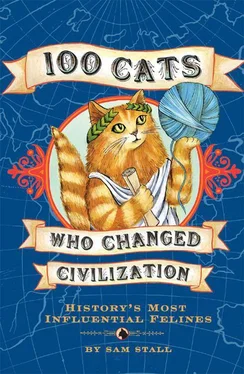
NADJEM
THE FIRST CAT WITH A NAME

It is widely believed that domestic cats evolved from the African wildcat, a tabby-like creature called Felis silvestris libyca , along the banks of the Nile River. The first farmers, desperate to defend their hard-won stores of grain from rats and mice, were doubtless overjoyed when these small, lithe predators took up residence near their granaries, looking for easy kills. They were so happy, in fact, that they perhaps went out of their way to attract them and to see to their comfort.
It wasn’t long before those wild hunters became thoroughly domesticated, insinuating themselves not just into Egyptian homes, but into Egyptian culture as well. The cat goddess Bast became a popular cult figure, as did another, more sinister feline deity called Sekhmet. Felines in general were considered divine messengers, and killing one was taboo. Those who did so, even by accident, were often lynched on the spot by angry mobs. Pampered housecats wore earrings, nose rings, and expensive collars, and upon death they were often mummified and given lavish burials. Hundreds of thousands of cat mummies have been discovered all over Egypt.
And yet, though their pictures adorned everything from palace walls to scrolls to jewelry, very little was written or said about individual cats. Most, it is believed, didn’t even have names. They were all referred to simply as mau , which literally means “he who mews.”
That’s what makes one particular cat, who lived and died during the reign of Pharaoh Thutmose III (1479–1425 BC), so unique. The feline in question was called Nadjem (meaning “dear one” or, perhaps, “star”). Nadjem was mentioned on the wall of the tomb of a low-level functionary named Puimre, who was interred outside the ancient city of Thebes.
There’s little else to say about Nadjem, other than that Puimre must have loved him (or her) a great deal. Too bad he can never know the enormity of the boon he bestowed upon his pet. By choosing to preserve his cat’s moniker for posterity, he made him (or her) the first feline in recorded history who we can call by name.
MUEZZA
THE CAT WHO WAS MOHAMMED’S FAVORITE PET

Christianity has always viewed the cat with suspicion. Over the centuries the poor creature has been accused of every conceivable crime, from stealing the breath of newborns to serving as Satan’s minion. Islam, however, takes the opposite view. The cat is so highly esteemed that it is even allowed in mosques.
Felines owe this exalted status to Muezza, the adored pet of the Prophet Mohammed. One day, as his faithful pet slept on one of the sleeves of his robe, Mohammed was called away to prayer. Rather than disturb the cat, he cut off the sleeve. When he returned, Muezza bowed to his master and received three strokes down her back in return. This blessing assured her a spot in the afterlife.
According to other tales, Mohammed would give sermons in his home with Muezza nestled in his lap. The stories are unclear as to what type of cat she was. However, this hasn’t stopped feline fanciers around the world from stating that she was everything from a tabby to an Angora to an Abyssinian.
DICK WHITTINGTON’S CAT
THE CAT WHO LAUNCHED A POLITICAL CAREER

Situated atop London’s Highgate Hill stands a statue of a feline known simply as Dick Whittington’s cat. According to legend, he belonged to a man named Richard Whittington, who lived from 1350 to 1423 and served as mayor of London four times. Yet it is doubtful he would be remembered at all were it not for the stories about his wonderful pet—a pet who, in real life, he probably never possessed.
A great deal is known about the real Dick Whittington. He was the younger son of Sir William Whittington, Lord of the Manor of Pauntley in Gloucestershire. He made a fortune selling fine cloth and was on good terms with both King Richard II and his successor, King Henry IV. He married a woman named Alice Fitzwarren and, of course, served as London’s mayor. After his death, he willed his vast fortune to charity.
And then something strange happened—something that would transform the real Whittington into the hero of a childhood fable. The people of London, anxious to know more about their benefactor, invented a biography that centered around, of all things, a cat. The centuries-old account casts Whittington as a poor country lad who came to the big city to make a name for himself. He worked for a merchant named Fitzwarren and fell in love with Alice, his daughter. His sole possession was a cat, whom he gave to a sea captain to sell during his voyage.
Sometime afterward, Whittington decided to return to his hometown of Gloucestershire. But as he trudged past Highgate Hill he heard the city’s bells tolling. They seemed to say, “Turn again, Whittington, three times Lord Mayor of London.” So he went back to Fitzwarren’s house, where he learned that the captain he’d given his cat to had returned with incredible news. A foreign potentate whose palace was overrun by rats had bought the cat, paying with a huge pile of gold. Dick instantly became wealthy, married Alice, and eventually became Lord Mayor of London three times as predicted, plus an additional term.
The tale became (and remains) a popular children’s story retold regularly in books, plays, and pantomimes. One doubts that the real Whittington would mind. The cat with whom he shares the limelight has won him lasting fame.
THE CATERER
THE CAT WHO USED PIGEONS TO HELP A JAILBIRD

Throughout most of human history, politics was a winner-take-all proposition in which losers forfeited their fortunes and lives. Such was almost the case for Sir Henry Wyatt, who was born in Yorkshire, England, in 1460. During the two-year reign of King Richard III, he supported the claims of Henry Tudor, Earl of Richmond, to the throne. The king had Wyatt imprisoned in the Tower of London, where he was kept in freezing conditions, tortured, and fed a starvation diet.
But one day a feline walked through the grate covering the cell’s window and made the acquaintance of the room’s emaciated inmate. Wyatt, overjoyed to have company, petted and praised the cat. The two became fast friends, and the stray promptly set about saving its human companion’s life by killing pigeons and fetching them to Wyatt’s cell.
The famished prisoner gladly accepted them, and he convinced one of his jailers to dress and cook the birds. Soon the feline was referred to as Wyatt’s acater (caterer). Thus fortified, Wyatt held out against all adversity until, finally, Richard III was ousted from the throne by Henry Tudor, who was crowned Henry VII. Needless to say, the former prisoner’s prospects rapidly improved. He was freed from the Tower, given wealth and title, and lived to the ripe old age of eighty.
Through it all he never forgot the kindness of the Tower cat, whose fate is unrecorded. One hopes that Wyatt found a way to help his benefactor, as he did almost every other cat he encountered. “Sir Henry in his prosperity would ever make much of a cat, and perhaps you will never find a picture of him anywhere, but with a cat beside him,” said one historical account.
Читать дальше














